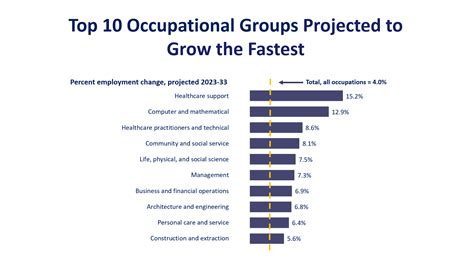Introduction:
The field of medical science is rapidly advancing, leading to exciting opportunities and a promising employment outlook for professionals. With the increasing prevalence of chronic diseases, technological advancements, and a growing focus on preventative healthcare, the demand for qualified medical science professionals continues to surge globally.

Growing Demand in Healthcare:
According to a report by the U.S. Bureau of Labor Statistics (BLS), the healthcare industry is projected to add 2.6 million new jobs from 2020 to 2030. This growth is attributed to an aging population, rising life expectancy, and the increasing prevalence of chronic conditions such as diabetes, heart disease, and cancer.
1. Aging Population:
As the population ages, the need for healthcare services increases significantly. Seniors require more medical attention, leading to higher demand for geriatric care professionals, including physicians, nurses, and therapists.
2. Chronic Disease Management:
The rising prevalence of chronic diseases is driving demand for medical science professionals who specialize in managing these conditions. Cardiologists, endocrinologists, and nephrologists are in high demand as they play a crucial role in treating and monitoring patients with chronic diseases.
Technological Advancements:
Technological advancements are revolutionizing the field of medical science, creating new opportunities for employment. Medical data analytics, precision medicine, and robotic surgery are just a few examples of emerging technologies that are transforming healthcare delivery.
1. Data Analytics:
Medical data analytics professionals use advanced statistical techniques to analyze large volumes of healthcare data, improving patient care and disease management. They are highly sought after by healthcare organizations and research institutions.
2. Precision Medicine:
Precision medicine involves tailoring medical treatments to a patient’s individual genetic makeup. Medical geneticists, molecular biologists, and clinical research scientists are in demand as they play a key role in developing and implementing precision medicine approaches.
3. Robotic Surgery:
Robotic surgery is becoming increasingly prevalent, offering benefits such as enhanced precision, reduced pain, and faster recovery times. Surgeons trained in robotic surgery are in high demand as hospitals and surgical practices adopt this technology.
Preventative Healthcare:
The growing emphasis on preventative healthcare is creating opportunities for medical science professionals specialized in health promotion and disease prevention. Health educators, wellness coaches, and registered dietitians are in demand as they play a vital role in empowering individuals to adopt healthy lifestyles.
1. Health Promotion:
Health promotion professionals focus on promoting healthy behaviors and reducing risk factors for chronic diseases. They are employed by government agencies, schools, and non-profit organizations to educate and encourage healthy habits within communities.
2. Disease Prevention:
Disease prevention specialists work to identify and reduce the risk of chronic diseases through screenings, vaccinations, and lifestyle interventions. They are in demand in public health departments, research institutions, and primary care settings.
New Applications:
The field of medical science is continuously evolving, creating new areas of specialization and employment opportunities. Personalized medicine, wearable health devices, and regenerative medicine are just a few examples of emerging applications that are generating new job roles.
1. Personalized Medicine:
Personalized medicine refers to the tailoring of treatments and interventions to individual patients based on their genetic makeup, lifestyle, and environment. It has led to the creation of new job roles, such as personalized medicine consultants and genomic counselors.
2. Wearable Health Devices:
Wearable health devices, such as smartwatches and fitness trackers, are revolutionizing remote patient monitoring and self-care. Medical science professionals specializing in wearable data analysis and digital health are in high demand as these technologies become increasingly integrated into healthcare delivery.
3. Regenerative Medicine:
Regenerative medicine involves the use of stem cells and other technologies to repair or replace damaged tissues and organs. Medical researchers, cell biologists, and clinical trial specialists are in demand as this field advances with the potential to treat chronic diseases and injuries.
Common Mistakes to Avoid:
- Lack of Specialization: Medical science is a vast field with numerous specialties. Focusing on a specific area of expertise can enhance your employability and increase your value in the job market.
- Neglecting Continuing Education: The field of medical science is rapidly changing. Stay up-to-date with the latest advancements through continuing education courses, seminars, and conferences.
- Over-reliance on Technology: While technology is transforming healthcare, it is important to strike a balance between using technology and providing personalized and compassionate care. Focus on developing strong communication and interpersonal skills.
How to Prepare for a Successful Career:
- Education: Pursue a degree in a medical science field, such as medicine, nursing, biomedical engineering, or healthcare administration. Consider specializing in a high-demand area to increase your employment opportunities.
- Experience: Gain hands-on experience through internships, clinical rotations, and research projects. This will provide you with valuable skills and connections.
- Networking: Attend industry events, join professional organizations, and establish relationships with professionals in the field. Building a strong network can lead to job opportunities and career advancements.
- Research: Stay informed about emerging trends and advancements in medical science. This will enable you to identify new job opportunities and prepare for the future.
Benefits of a Career in Medical Science:
- High Demand: Medical science professionals are in high demand, ensuring job security and career stability.
- Impactful Work: A career in medical science allows you to make a meaningful difference in the lives of others by improving their health and well-being.
- Continuous Learning: The rapidly evolving field of medical science provides ample opportunities for professional development and lifelong learning.
- Competitive Compensation: Medical science professionals typically earn competitive salaries and benefits packages.
- Sense of Purpose: Working in medical science offers a sense of purpose and fulfillment, knowing that your work is contributing to the well-being of society.
Conclusion:
The employment outlook for medical science professionals is incredibly positive. The aging population, rising prevalence of chronic diseases, technological advancements, and growing emphasis on preventative healthcare are driving demand for qualified individuals across the globe. By pursuing specialized education, gaining hands-on experience, and staying up-to-date with the latest advancements, you can position yourself for a rewarding and impactful career in this thriving field.
